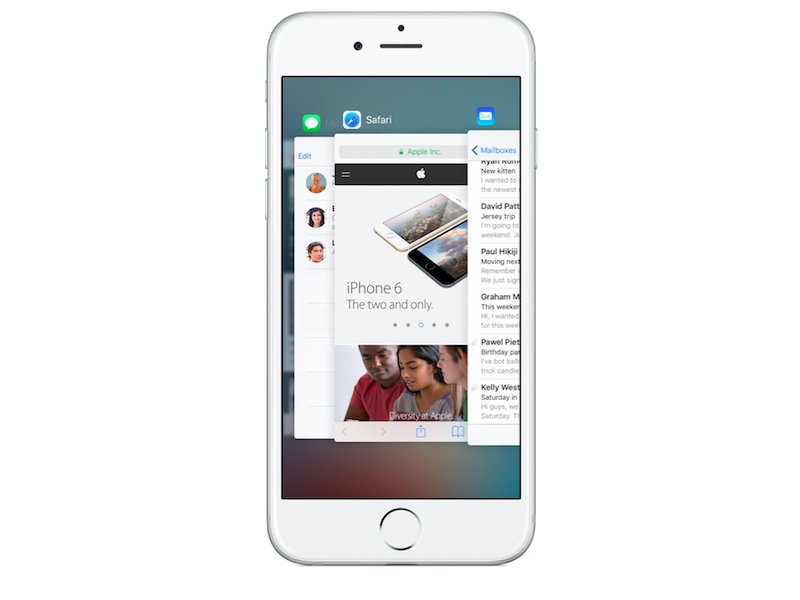- Home
- Mobiles
- Mobiles News
- Apple's Federighi Busts Myth That Quitting iOS Apps Improves Battery Life
Apple's Federighi Busts Myth That Quitting iOS Apps Improves Battery Life

You can't help but notice new iPhone users, especially the ones who have moved from Android, obsessively try to kill apps on their smartphone. Many believe that doing this improves battery life. That's not the case, as has been pointed out by many in the past few years. But if you needed an official word to convince your heart, Apple's Senior Vice President Craig Federighi is here to the rescue.
Responding to a user's query, originally directed at Apple CEO Tim Cook, on whether he quits apps on his iPhone when multitasking and if that improves the battery life, Federighi wrote, "No and No." There you go: stop manually killing apps on your iPhone, because that doesn't do anything.
Apple's support website also suggests the same, though we agree it doesn't do it as succinctly as Federighi. "After you switch to a different app, some apps run for a short period of time before they're set to a suspended state. Apps that are in a suspended state aren't actively in use, open, or taking up system resources. With Background App Refresh, suspended apps can check for updates and new content. "
To people who have been thinking it wrong all along, it's not your fault. Forcing an app to quit seems like a logical way to free up memory and hence save battery life. Moreover, that's exactly how Android and Windows respond to such actions. But it wouldn't work on iOS because of how it has been designed to handle it.
Developer Fraser Speirs explained this back in 2012. According to him, when a user presses the home button, an app moves from Active state to Background state, a state in which the app is not visible on the display but is still running in the background. Most apps remain in the Background state for a few seconds and then go to Suspended state, in which your app lives in the memory, but doesn't utilise battery power.
"You may think that, if an app is resident in memory, you have to somehow remove it to conserve memory. You don't because iOS does it for you," he wrote. "If there are Suspended apps lying around and you launch a memory-intensive app such as a big game, iOS will start to purge Suspended apps and move them to the Not Running state. That is, they will be completely removed from memory and will launch afresh the next time you tap their icon."
On the contrary, manually quitting apps could have a negative impact on your iOS device's battery life. As LifeHacker pointed out in 2014, when you close an app, it goes in the idle state but stays in the memory. When you manually quit the app, it moves the app out of your RAM. This, in turn, would require your phone to open the app from scratch again - as opposed to simply pulling it from the memory, and hence, use some extra energy.
For the latest tech news and reviews, follow Gadgets 360 on X, Facebook, WhatsApp, Threads and Google News. For the latest videos on gadgets and tech, subscribe to our YouTube channel. If you want to know everything about top influencers, follow our in-house Who'sThat360 on Instagram and YouTube.
Related Stories
- Samsung Galaxy Unpacked 2025
- ChatGPT
- Redmi Note 14 Pro+
- iPhone 16
- Apple Vision Pro
- Oneplus 12
- OnePlus Nord CE 3 Lite 5G
- iPhone 13
- Xiaomi 14 Pro
- Oppo Find N3
- Tecno Spark Go (2023)
- Realme V30
- Best Phones Under 25000
- Samsung Galaxy S24 Series
- Cryptocurrency
- iQoo 12
- Samsung Galaxy S24 Ultra
- Giottus
- Samsung Galaxy Z Flip 5
- Apple 'Scary Fast'
- Housefull 5
- GoPro Hero 12 Black Review
- Invincible Season 2
- JioGlass
- HD Ready TV
- Laptop Under 50000
- Smartwatch Under 10000
- Latest Mobile Phones
- Compare Phones
- Moto G15 Power
- Moto G15
- Realme 14x 5G
- Poco M7 Pro 5G
- Poco C75 5G
- Vivo Y300 (China)
- HMD Arc
- Lava Blaze Duo 5G
- Asus Zenbook S 14
- MacBook Pro 16-inch (M4 Max, 2024)
- Honor Pad V9
- Tecno Megapad 11
- Redmi Watch 5
- Huawei Watch Ultimate Design
- Sony 65 Inches Ultra HD (4K) LED Smart TV (KD-65X74L)
- TCL 55 Inches Ultra HD (4K) LED Smart TV (55C61B)
- Sony PlayStation 5 Pro
- Sony PlayStation 5 Slim Digital Edition
- Blue Star 1.5 Ton 3 Star Inverter Split AC (IC318DNUHC)
- Blue Star 1.5 Ton 3 Star Inverter Split AC (IA318VKU)
















